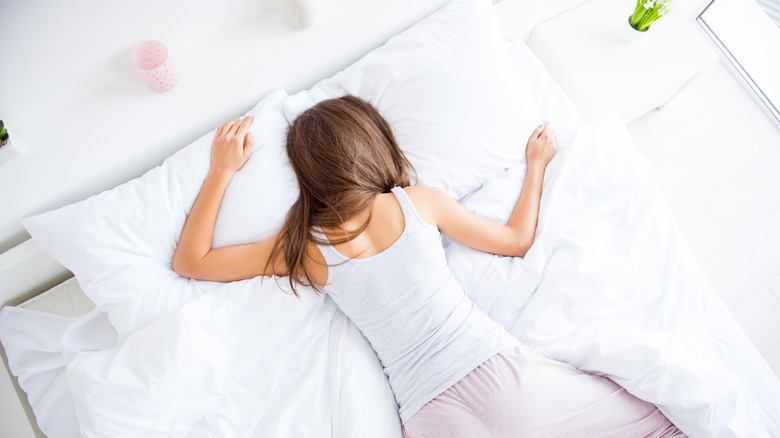Is It Bad To Sleep On Your Stomach?
Getting comfortable enough to fall asleep in the first place is something most of us struggle with regularly, never mind worrying that the way we're sleeping is wrong. Finding the right position is key, and there are tons of funny diagrams, such as this one from Reader's Digest, explaining why sleeping in a ball means you're secretly harboring romantic desires about your plant (or whatever).
What about the actual science behind various sleeping positions? Is one of the most common of all, sleeping on your stomach, simply a matter of preference — or could it actually be bad for your health?
Why sleeping on your stomach is bad for you
In a Healthline piece, it's noted that sleeping on your stomach is frankly not a good idea. This particular position is very taxing on your back and neck, which can lead to poor sleep at night and discomfort during the day. If you typically sleep on your stomach, then you're more likely to experience pain in your neck, back, or joints, which is not only painful, it can negatively impact sleep.
According to research conducted by the Mayo Clinic, sleeping on your stomach puts a significant strain on your back because most of your weight is resting on the middle of the body, making it more difficult to maintain a neutral spine while sleeping. Spinal stress can cause pain basically anywhere in the body, too. You're also putting your neck and spine out of alignment by sleeping with your head turned to one side on the pillow, which can lead to neck problems.
Ways to solve stomach sleeping woes
Those looking to change up their sleeping position should sleep on one side instead. As Dr. Tom Micklewright explained to RTE, this is the best sleeping position as it can simultaneously help keep snoring at bay while also keeping your spine in tip-top shape.
If you're a lifelong stomach sleeper, try to sleep without a pillow — or with the flattest pillow you can find. It's important to keep your head and neck as straight as possible. As orthopedic surgeon Rocco Monto told Health, fuller pillows push your neck back, which can cause neck or back pain.
Alternatively, you can place a pillow under your pelvis, which helps neutralize your spine and takes the pressure off your back and neck. Also, make sure to stretch first thing in the morning to get your body back into alignment. This applies throughout the day too, particularly if you're feeling stiff.
As Stephanie Romiszewski, sleep expert and physiologist, told RTE, "It's important to remember that moving during the day is just as important as resting our bodies at night. Try a variety of stretches before going to bed and when you wake up to relieve this discomfort."


